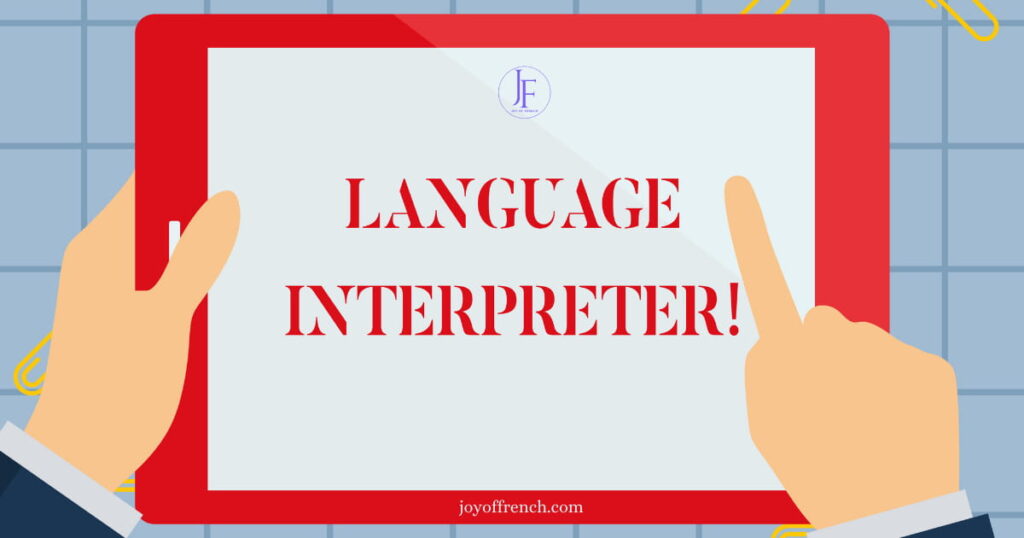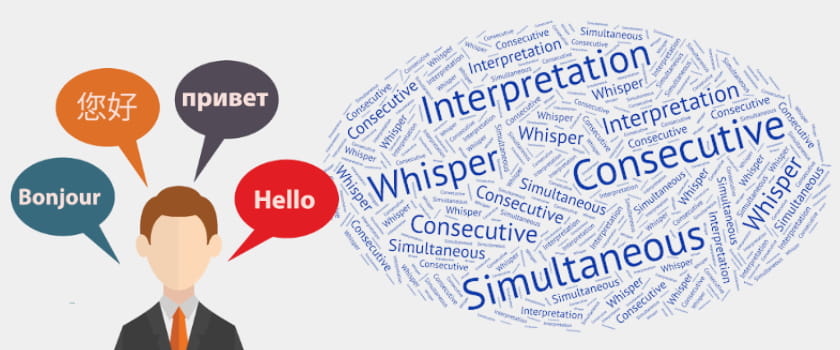There are countless reasons to learn the French language. For example, passion, cultural aspects, the booming economy of the Francophone world, fun, wide usage, and so on.
As a result, there is a higher demand for French skills. We have a more comprehensive selection of job options now.
Of all, interpreting is a highly sought-after career that requires French.
The profession of a French interpreter is lucrative and demanding. It is vital for communication between people who speak distinct languages.
You’ll receive multiple benefits, including job opportunities and a high income. This is a career that you’ll find incredibly rewarding overall!
If you want to learn and become a French interpreter, this is the right place.
This ultimate guide contains all the information you need to pursue this occupation. I’ve discussed various aspects, like job types, requirements, prospects, salaries, benefits, and drawbacks.
It’s time to begin!
Table of Contents

What does a French interpreter do?
A French interpreter with exceptional speaking abilities should be able to work up close in real time. The aim is to simplify communication between native and non-native French speakers.
The interpreter’s role is to accurately convey the original message’s intent. They factor in cultural nuances, slang, and faux pas.
The work environment is diverse, with different settings and setups. It comprises government bodies, international associations, private firms, agencies, and freelancers.
Besides advanced French proficiency like B2 of DELF, TEF, or TCF Canada, candidates must also fully know the target language. Fundamental qualities include confidence, superior interpreting skills, and a clear voice.
Interpreters often possess specialized knowledge in specific industries. Examples include law, IT, science, finance, engineering, and healthcare.
By accepting this role, you’ll get to travel and expand your knowledge of diverse cultures. You can immerse yourself in the Francophone region’s arts, foods, music, history, festivals, customs, and traditions.
There are prospects available for both full-time and part-time freelancing. Your job involves translating conversations into another language for clients across diverse businesses and domains.
You can develop subtitles for television and videos with online tools.
What sets interpreters apart from translators?
Language is a common focus for both interpreters and translators. Yet, their roles are separate, and their skills are unique.
Interpreters provide real-time translation between two languages. On the other hand, the job of a French translator is to convert written texts from one language to another.
Translation is for written words, while interpretation is for spoken.
Fluency in two languages is a must for interpreters. You must quickly think and convey the meaning.
With the help of further resources and materials, you can take your time with translations.
You don’t have to be perfect in the target language, either. That’s because the work isn’t quick and time-bound. In short, it’s less complex than interpretation.
Interpreting between many individuals is both complex and fast-paced. An interpreter requires more advanced abilities despite some similarities between the two.
Different French Interpretation Job Types
The ways and scope of interpretation have undergone constant changes. Hence, organizations have varying needs.
There is a wide range of interpretations for the work today. These are 9 common types of French interpreters.

(i) Simultaneous interpreting
It is used for large-scale events, such as meetings, training sessions, and conferences. It listens and understands what the speaker says. Then, it translates instantly.
It’s not live yet because of a slight few seconds delay. Interpreters need to know the complete meaning of the text to interpret it correctly.
This work is both difficult and influential. One needs to remain alert and active throughout the project.
The speaker could lose a few words or even a whole idea or sentence because of a delay. There is absolutely no room for negligence.
(ii) Consecutive interpretation
The second form of interpretation involves using a back-and-forth style. Short events like news conferences, business gatherings, or courtrooms are good examples.
Near the presenter, interpreters deliver consecutive interpretations.
After speaking in their mother tongue, the speaker takes a pause. It often ends with each topic, opinion, and paragraph.
The interpreters silently listen to a few sentences and then translate them into the target language.
This method teaches how to take notes. Only a few people can memorize a whole paragraph without missing any details after hearing it just once.
(iii) Chuchotage or Whispered interpreting
The process of whispered interpretation involves listening and analyzing before whispering to the client. The interpreter delivers messages quietly in the client’s preferred language.
Chuchotage and simultaneous interpreting are equally problematic.
The interpreter executes all these tasks at the same time. E.g., it hears, comprehends, translates, and expresses speech in the target language.
Smaller sessions with fewer participants suit the work’s nature and low voice. Managing large-scale events like discussions and summits is not practical with this method.
(iv) Telephone Interpreting (Over-the-Phone / OPI)
There are two categories of scheduled interpreting — simultaneous and consecutive telephone. Instead of in-person meetings, it uses the telephone approach for confirmed appointments.
If participants are comfortable with the interpreter’s voice, simultaneous telephone interpreting is an option. Picking for the back-to-back format is a better choice.
Still, there are a few flaws. Interpreters must exercise more outstanding care since they cannot watch speakers’ nonverbal cues. Since it is not accessible to them, it restricts context and meaning.
(v) Travel interpretation
Interpreters fulfill a similar role to tour guides. Yet, they must be fluent, precise, and culturally familiar.
They help tourists and customers who don’t speak the local language by escorting them to their desired places. Besides being skilled in language, knowing the client’s destination and customs is elemental.
Being a traveling interpreter implies more than just interpreting skills. It covers booking hotels and taxis, shopping, and ordering food. It can also facilitate multi-million-dollar deals.
(vi) Bidule interpreting
The Bidule is formed of a portable receiver and transmitter.
Simultaneous translation is possible without a cabin using this technique.
The transmitter uses a microphone to translate the speakers’ words into a distinct language. The audience uses headphones to hear the dialogue.
This service is ideal for small groups, tours, seminars, or corporate retreats. It’s easy to carry and use without specialized technicians. Also, it’s budget-friendly.
(vii) Liaison interpreting
Note-taking is not required in this interpretation mode. It allows for a two-way connection. This procedure is also widely adopted.
The function of a liaison interpreter is to interpret casually between individuals or groups.
Different from the consecutive approach, this method is less accurate. Word-for-word interpretation is unnecessary as well.
(viii) Relay interpretation
Relay interpretation is practical when a specific language pair lacks an available interpreter. This mandates the use of multiple interpreters.
German to Swedish is one example. Since Swedish interpreters have limited availability. A better option is selecting a more widely used language, like English.
The result will be translated from German to English and then to Swedish.
It will take more time and money to complete. When no interpreter is available in a specific language pair, this is often the only way to finish important work.
(ix) Business interpreting or negotiation
The goal of negotiation interpretation is to improve contact in business negotiations. Ideal groups are small, but accuracy and responsibility are integral.
These discussions require an experienced interpreter. They need the skills and time to prepare, which is also vital.
Advantages of becoming a French interpreter
Those who study French can benefit from working as interpreters. Here are some bases.

(i) French speakers make up a significant market
French is the sixteen most spoken mother tongue and the fifth most-spoken language after Chinese, English, Hindi, and Spanish. It is the second most widespread Romance language and the third most used online.
Learning French is common among language learners. Over 20 official French-speaking nations have over 300 million speakers. Plus, French learners exist across countries and continents.
There is economic growth happening in certain Francophone countries, too. It leads the way in various sectors and highlights its diverse nature.
The major industries in France include auto, aerospace, shipbuilding, pharmaceuticals, fashion, defense, telecom, manufacturing, etc.
Canada’s economy is driven by key sectors such as real estate, mining, petroleum industries, manufacturing, forestry, IT Consulting, and more.
Having a sizeable French-speaking population opens up many potentials. It can promote interaction between native and non-native speakers.
It allows for practical communication in various situations. Some examples are medical meetings, legal processes, and business deals.
French interpreters have several job options, even in specialized fields.
Some careers require a combination of effort, diverse skills, and specific needs. Though challenging, these positions have attractive paychecks and impressive incentives.
French interpreters can enhance comprehension and foster cultural connections among individuals and institutions.
(ii) Interpreters are in higher demand
Interpreters are necessary for French firms and international businesses. This growth is because of the Francophone world’s global influence and thriving economy.
The primary reason is France and French-speaking regions expanding trade to international markets. This is a notable advantage of learning French.
To target this growing market, foreigners must interact in the same language. Few French speakers work in this field, which adds to its appeal. Two reasons explain this.
French speakers have a weaker grasp of English compared to the global population.
People who can translate from English to their native languages are needed. This is because many documents have already been translated from French to English.
Most French speakers need help with their accents and dialects when speaking English.
With sufficient practice, foreigners can find it easier to sound more French. The demand for interpretation services is higher among them.
Interpreters are in demand in law, healthcare, education, and business. The need is expected to increase as the world becomes more connected through contact and travel.
(iii) Expand your horizons
Learning a new language expands your understanding of human existence. For interpreters to excel, they must know the source, target languages, and country of origin.
The interpreter or localizer’s deep knowledge of the cultures helps them to handle the project’s hardship.
This also motivates them to create positive and noteworthy results.
They often learn in collaboration with others, not just through their work.
Attending conferences and events helps linguists improve their skills and network with experts. Tailored courses for interpreters are also an option for them to pursue.
(iv) Flexibility
A career as a French interpreter offers limitless possibilities.
The job prospects are vast. Internet technology broadens professional networks beyond local boundaries.
You can work part-time for various organizations while having a full-time job. Trying new ideas often begins with freelance work.
(v) French interpreters earn good pay
A career in French interpreting can be highly profitable with an excellent salary. A certain level of professional experience is often necessary for this profession.
It’s noteworthy to note that the earning potential can vary. One should consider various factors. For instance, sector, locations, domain-specific details, references, and background.
French interpreters earn more on average than other foreign language jobs. Interpreters with experience can earn higher wages.
Many of them work as freelancers instead of being full-time employees. You can be paid either hourly or based on project completion. They find satisfaction in increased pay and enhanced flexibility.
Yet, job instability is still a regular concern for them.
Disadvantages of Being a French Interpreter
Just like any other job, French interpreters have their own set of shortcomings. I’ve compiled a list of a few things below.

(i) Lack of subject-matter competence
Not all work is generic. Technical knowledge is vital in some lines of work.
Interpretation involves more than just language. Knowledge in other fields, such as politics, history, technology, etc., is helpful.
Interpreters need familiarity in various sectors, like medicine, technology, engineering, law, etc. Without a background, misinterpretation and mistakes can occur.
Extensive experience in a particular industry or area of expertise is crucial. Specific details are necessary to define objectives and priorities correctly.
Cultural context matters. France, Canada, Europe, and Africa have diverse customs that may be hard for an interpreter to understand. This can lead to misunderstandings.
A deep understanding of a particular trade, market, or field is a must for providing high-quality services. Professional interpreters are in prime need and can earn a good salary.
(ii) You need to be fluent in French
Becoming fluent in French requires substantial knowledge and time. Most learners recognize this. French is viewed as a moderately complex language.
One needs to achieve advanced levels like DALF C1 or C2. DELF B1 or B2, which are intermediate levels, are insufficient for success. Continuous studying, learning, and researching are central to fluency in French.
Besides the language, staying up-to-date with news from the French-speaking population matters.
One restriction of French language tests is the ability to represent different languages and emotions. Interpreting verbal talk can be challenging for some.
They need help to convey sound and feeling. Nonverbal cues, facial expressions, and body language must be understood.
A sensitive, unknown, or intricate subject may also question skilled interpreters.
(iii) Interpreting jobs is tiring
The job of an interpreter demands absolute attention all the time. They must understand the task’s nature, domain, and objective over extended periods. It can be demanding and mentally stressful.
A steady process of listening, understanding, and conveying information is crucial.
Extended work hours in pressured situations could cause mental and physical exhaustion. It can lead to errors or incomprehension. Sensitive, unknown, or tough subjects may also question skilled interpreters.
(iv) Interpreting jobs are often unstable
Various factors can influence the stability of an interpreter’s job. Large corporations or the Government provide more stable jobs.
Freelance or contract work may be less long-lasting. Freelancers often require help to secure regular work. They regularly search for new clients and assignments.
They may have to cope with fluctuating pay and a lack of extra perks and incentives. Job stability can differ immensely because of the varied nature of work and industries.
Researching the job market and likely employers is necessary before seeking an interpreter career.
What are the requirements for becoming an interpreter?
To succeed as a French interpreter, meeting certain conditions is a must. Here are some of the most noteworthy.

1. Proficient in French and another language
Fluency in two languages is crucial for becoming a French interpreter. The mix could be French and another language. E.g., English or your native language.
This encompasses professional language skills in both speaking, reading, and writing.
It’s crucial to have advanced-level skills. It will help if you consider enrolling in long-term, offline, or online courses in French. You can study at universities, private institutes, or with a tutor.
Immersion is the most effective method for improving language skills. TV series and movies are available for French learners, along with songs and podcasts. French apps are worth a try, too.
Through engagement and exchange, immersion enhances your language skills.
Being a French interpreter typically involves immediate translation, thinking, and interaction. You must have exceptional French skills and speak almost like a native speaker.
Specific organizations may require certified interpreters for particular official or recognized institutions.
You can choose from university certificates, degrees, or international diplomas. Having DELF and DALF, or masters in French, can improve your job search.
2. Experience in the same field
To become an interpreter, having experience in the same field is essential. Internships are a great way to gain this experience.
Many companies offer internships, whether paid or unpaid. This allows you to apply your understanding of studying and real-life situations.
Gaining experience through volunteer work is highly valuable as well. Unpaid work still provides valuable practical knowledge for your resume.
3. Cultural knowledge and domain expertise
Knowing culture, customs, and etiquette is paramount. It’s crucial when interpreting foreign languages and traditions.
Listen to songs, music, and podcasts to improve your French skills. You can also view documentaries, films, and TV shows.
Industry-specific details are crucial for accurate interpretation. For example, healthcare, law, or business, to prevent errors.
Being well-versed in French traditions and customs can be helpful. French films can be beneficial for learners in this aspect.
These tools can assist you in navigating social situations and optimizing on-site work.
4. Interpreting skills and professionalism.
Proper tone and emotion must be conveyed when interpreting. It allows for nonverbal expression and accurately reflects idiomatic sayings.
They are also required to uphold confidentiality and professionalism.
Nowadays, interpretation heavily depends on modern technologies. Examples include videoconferencing, online, and remote software.
Developing the research skills necessary for translating French materials requires time and effort.
Time management is a must for successful interpreters. Patience, active listening, confidence, adaptability, and honesty are required.
Before you begin, decide on the areas where you lack knowledge. Your work and study can help.
Interpreters can work in different settings. Adapting to the subject, setting, and culture is vital. Thus, candidates must be in good physical and mental health.
How much time does it take to become an interpreter?
Becoming a successful French interpreter takes years of dedicated study and practice. Factors such as learning style, mother tongue, dedication, and time invested determine the time to learn French.
According to the Foreign Service Institute (FSI) research, fluency in French takes around 600-750 hours.
This increases to 1200-1500 hours with 1:1 classroom sessions and self-study. It takes approximately three years to attain advanced ability in French.
You can pursue Bachelor’s and master’s degrees in French at a university. Professional interpreters require years of study, proper training, and certification.
Continuing to practice and learn is crucial for maintaining skills. One can start a career as a French interpreter after achieving advanced fluency. This is equivalent to a near-native level.
Besides French proficiency, ability in English or another language is crucial. Knowledge of translated cultures and industries also matters.
How much does a French interpreter make? — Salary
The salary of a French interpreter varies depending on industry, profile, location, and experience level.
According to PayScale, French interpreters in the United States earn an average annual salary of $51,000, ranging from $31,000 to $82,000.
Specialization in legal, technical, or medical interpreting may cause higher earnings. Location and experience level also play a role in deciding pay.
In India, a French interpreter with a C2 level or MA degree can expect a starting salary of around 50,000 to 75,000 rupees per month.
Earning potential increases with industrial experience or a C1/C2 diploma.
Interpreters with a DELE C2 certification in France can earn a substantial income. The average salary for interpreters in France is around €30,000.
What are the job options, and where do you find them?
Various job options are available if you want to work as a French interpreter.
You can contact companies or use job portals to find work. There are also communities and forums for interpreters where you can connect with others and discuss career options involving French.

(i) International organizations and governments
One option is to work for international organizations and governments. They need interpreters to promote communication and build relationships with other nations.
This may involve translating written documents or being an interpreter at meetings and events.
There are also opportunities to work in big institutions like the UN, embassies, and consulates.
(ii) Private sector and French companies
Another option is to work for French companies in the private sector.
Many companies from the Francophone world operate globally and offer employment opportunities. You can find job openings on portals and networking sites like LinkedIn.
Commercial and industrial firms of all sizes deal with the French-speaking market and require document interpreters.
(iii) Interpretation agencies and businesses
Interpretation agencies and businesses also offer job opportunities for experienced interpreters.
This job prospect is open to those with notable experience.
(iv) Freelance
Freelancing is a popular choice for French speakers because it offers flexibility. There is a high demand for interpreters in countries like France because of the large amount of trade.
Many companies are seeking French interpreters. The hiring process is less competitive because of supply and language complexity.
(v) Events and academic centers
Develop your knacks as an interpreter by volunteering at events like film festivals, painting exhibitions, music festivals, and French-related events.
Although you won’t be paid, it will be a valuable addition to your CV. It provides more practical experience than just attending meetings.
If you need interpreters, contact the French department of your university or a language school. Once you feel prepared and have approval from your instructors, you can start getting involved.
(vi) Events and academic centers
Businesses in France have a high demand for skilled workers, leading to collaborations and agreements with many countries. Many foreign workers can work in France and Canada thanks to these associations.
There are also ways to reduce the cost of this process. France, Quebec (Canada), and parts of Europe are incredible workplaces. But passing a higher-level French language test is essential to boost your chances.
In Asia, several programs recruit native English speakers to teach.
This opens up possibilities for working as an interpreter or an ESL teacher in France. You gain unique experience and engage in a foreign language with a decent salary.
Final Words on Career in French Interpretation

To pursue a career as an interpreter, fluency in French and an understanding of everyday situations are necessary. It’s helpful to grasp another language, like English or your mother tongue, if it’s in demand.
Reading, speaking, writing, and listening skills are beneficial, as the work may involve formal matters. Studying the standard form of French through textbooks or with a teacher can be helpful.
You can also use audio and video lessons, podcasts, books, and apps for learning French.
Becoming a French interpreter offers many prospects for personal growth and advancement. It’s a highly sought-after and well-paid profession and requires hard work and dedication, and the results may take time.
But with careful planning and persistence, your dreams can become a reality. Take benefit of this unique chance to learn French, develop fluency, and build a successful career.
Thank you for reading. If you have any thoughts or comments, please feel free to share.







